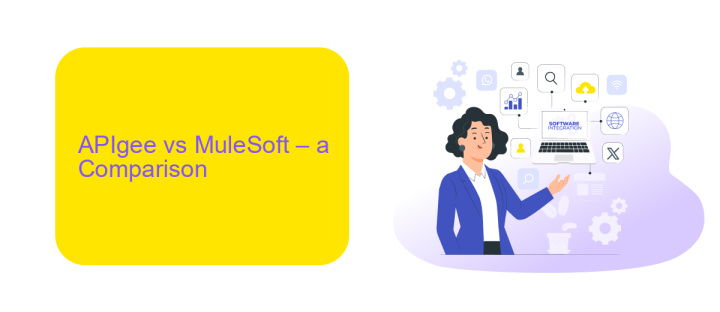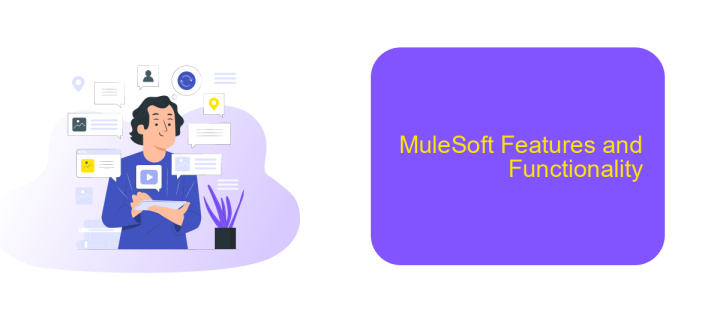What is The Difference Between APIgee and MuleSoft?
In today’s rapidly evolving digital landscape, businesses rely heavily on robust API management and integration platforms to streamline operations and enhance connectivity. Two prominent players in this field are APIgee and MuleSoft. This article delves into the key differences between APIgee and MuleSoft, exploring their unique features, use cases, and how they cater to diverse business needs.
What is an API and API Management?
An API, or Application Programming Interface, is a set of rules and protocols that allows different software applications to communicate with each other. APIs enable the integration of various systems, facilitating data exchange and functionality sharing between them. This is essential for creating a seamless user experience and enhancing the capabilities of applications.
- APIs allow different software systems to interact.
- They enable data exchange and functionality sharing.
- APIs are crucial for seamless user experiences.
API management involves the processes and tools needed to create, publish, secure, and monitor APIs. Effective API management ensures that APIs are reliable, secure, and scalable. Services like ApiX-Drive help in setting up these integrations effortlessly, providing a user-friendly platform to connect various applications without extensive coding knowledge. This way, businesses can streamline their operations and improve overall efficiency.
APIgee vs MuleSoft – a Comparison

APIgee and MuleSoft are two prominent platforms for API management and integration. APIgee, a product of Google Cloud, focuses primarily on API lifecycle management, offering robust tools for designing, securing, deploying, and analyzing APIs. It provides extensive support for RESTful APIs and is renowned for its ease of use, scalability, and comprehensive analytics capabilities. APIgee is particularly suited for enterprises looking to manage a large number of APIs with a focus on security and performance.
On the other hand, MuleSoft, now a part of Salesforce, offers a more extensive integration platform called Anypoint Platform. MuleSoft not only manages APIs but also facilitates integration across various systems, applications, and services. It supports a wide range of protocols and data formats, making it versatile for complex integration needs. MuleSoft is ideal for organizations needing a unified platform to handle both API management and broader integration tasks. For those looking to simplify integration processes, services like ApiX-Drive can be a valuable addition, providing easy-to-use tools for connecting various applications without extensive coding.
APIgee Features and Functionality

APIgee is a robust platform designed to help businesses manage and scale their APIs effectively. It offers a range of features that streamline the process of API development, deployment, and monitoring, ensuring seamless integration and high performance. APIgee is particularly valuable for organizations looking to enhance their digital ecosystems and improve connectivity between different services.
- API Gateway: APIgee provides a secure and scalable API gateway that facilitates traffic management, security, and analytics.
- Developer Portal: It offers a customizable portal for developers to access API documentation, test APIs, and manage their API keys.
- Security: APIgee includes robust security features such as OAuth, JWT, and SAML to protect APIs from threats and unauthorized access.
- Analytics: Comprehensive analytics tools help monitor API usage, performance, and detect anomalies in real-time.
- Integration with ApiX-Drive: APIgee integrates seamlessly with ApiX-Drive, enabling users to automate workflows and synchronize data across multiple applications effortlessly.
In summary, APIgee offers a comprehensive suite of tools that cater to various aspects of API management. From security and analytics to seamless integration capabilities with services like ApiX-Drive, APIgee ensures that businesses can optimize their API strategies effectively.
MuleSoft Features and Functionality

MuleSoft is a comprehensive integration platform that enables businesses to connect applications, data, and devices seamlessly. It provides a unified solution for API management, integration, and analytics, allowing organizations to streamline their digital transformation efforts.
One of MuleSoft's key features is its ability to facilitate the creation and management of APIs. The platform supports a wide range of integration patterns and protocols, making it versatile for various use cases. Additionally, MuleSoft offers robust tools for designing, building, and deploying APIs with ease.
- API Design and Management: Create, publish, and manage APIs with a user-friendly interface.
- Data Integration: Connect disparate data sources and ensure data consistency across systems.
- Real-time Analytics: Monitor and analyze API performance and usage in real-time.
- Cloud and On-premises Deployment: Flexibility to deploy integrations in the cloud or on-premises.
- Pre-built Connectors: Access a library of pre-built connectors to streamline integrations.
MuleSoft also offers a robust set of tools for managing integrations, similar to the services provided by ApiX-Drive. These tools simplify the process of connecting various applications and automating workflows, ensuring a seamless and efficient integration experience.
APIgee vs MuleSoft – Which is Right for You?
When deciding between APIgee and MuleSoft, it's crucial to consider your specific integration needs and technical requirements. APIgee, a product from Google Cloud, excels in API management, offering robust security, analytics, and developer tools. It's ideal for organizations looking to manage a large number of APIs with ease and ensure high performance and security. On the other hand, MuleSoft, part of Salesforce, provides a comprehensive integration platform that connects various applications, data, and devices. Its strength lies in its ability to handle complex integrations and facilitate seamless connectivity across different systems.
If your primary focus is on API management and you require a solution that provides detailed analytics and strong security features, APIgee might be the right choice for you. However, if your organization needs to integrate a wide range of applications and data sources, MuleSoft's Anypoint Platform could be more suitable. Additionally, for those looking for an alternative to streamline integrations, services like ApiX-Drive offer user-friendly tools to connect different systems without needing extensive technical expertise. Ultimately, the decision should align with your organization's specific goals and technical landscape.
- Automate the work of an online store or landing
- Empower through integration
- Don't spend money on programmers and integrators
- Save time by automating routine tasks
FAQ
What is the primary difference between APIgee and MuleSoft?
Which platform is better for API management?
Can MuleSoft also manage APIs effectively?
Is it possible to use both APIgee and MuleSoft together?
Are there any alternatives for automating and setting up integrations?
Time is the most valuable resource in today's business realities. By eliminating the routine from work processes, you will get more opportunities to implement the most daring plans and ideas. Choose – you can continue to waste time, money and nerves on inefficient solutions, or you can use ApiX-Drive, automating work processes and achieving results with minimal investment of money, effort and human resources.


